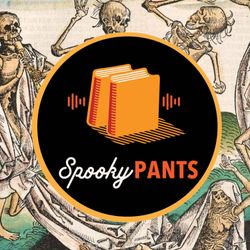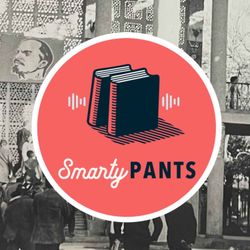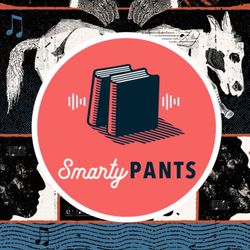Share

Smarty Pants
#269: Chaucer’s Leading Lady
We first spoke to Marion Turner, an English professor at Oxford University, in 2019, about her award-winning biography of Geoffrey Chaucer. In her latest book, The Wife of Bath: A Biography, Turner paints an unconventional portrait of Chaucer’s most famous—and clearly favorite—character: a bawdy, middle-aged, middle-class woman of multiple marriages. Alison of Bath is but one of the pilgrims Chaucer gathers around the table in his Canterbury Tales, but she is the only one to have inspired everyone from Shakespeare to James Joyce to Zadie Smith—and an equal number of misogynist critics, whether they were writing on vellum or in a 20th-century academic journal. Turner joins us on the podcast to discuss the Wife of Bath in her time and beyond, and why her voice still rings out with such force today.
Go beyond the episode:
- Marion Turner’s The Wife of Bath: A Biography
- Listen to our previous interview with Turner about Geoffrey Chaucer’s life
- Watch Jean “Binta” Breeze perform her adaptation of Chaucer’s tale, “The Wife of Bath in Brixton Market”
- Read Zadie Smith’s play, The Wife of Willesden (which you can see performed this month with its original star if you happen to find yourself in Cambridge, Massachusetts)
- Read Patience Agbabi’s poem “The Wife of Bafa” or watch her perform it at the modern version of the Tabard Inn—a brewery
Tune in every week to catch interviews with the liveliest voices from literature, the arts, sciences, history, and public affairs; reports on cutting-edge works in progress; long-form narratives; and compelling excerpts from new books. Hosted by Stephanie Bastek. Follow us on Twitter @TheAmScho or on Facebook.
Subscribe: iTunes • Stitcher • Spotify • Google Play • Acast
Have suggestions for projects you’d like us to catch up on, or writers you want to hear from? Send us a note: podcast [at] theamericanscholar [dot] org. And rate us on iTunes! Our theme music was composed by Nathan Prillaman.
More episodes
View all episodes

The Carnifex of Čachtice
38:19|Elizabeth Bathory is alleged to have been the most prolific serial killer of all time, responsible for butchering as many as 650 virgins and bathing in their blood. Her Hungarian water castles are the sites of gruesome ghost tours, a metal band named itself for her, and for years she was in the Guinness Book of World Records. The number of women she’s said to have killed is four times the population of an average 17th-century village, but when it comes to Bathory’s story, even the Guinness Book concedes that “it is impossible to separate fact from fiction.” Shelley Puhak disagrees: In her new book,The Blood Countess, she contends that Bathory was instead the victim of possibly the greatest misinformation campaign in history, brought against a powerful, wealthy woman at a tumultuous time. Lutherans and Calvinists were at one another's throats at the height of the Protestant Reformation, the Ottoman Empire lurked just across the border, and medicine in upheaval, with both new and old practices bringing accusations of heresy and witchcraft. It was a dark time to be a woman—especially one with 17 castles to her name, and no husband to defend her.Go beyond the episode:Shelley Puhak's The Blood Countess: Murder, Betrayal, and the Making of a MonsterTune in every (other) week to catch interviews with the liveliest voices from literature, the arts, sciences, history, and public affairs; reports on cutting-edge works in progress; long-form narratives; and compelling excerpts from new books. Hosted by Stephanie Bastek and sponsored by the Phi Beta Kappa Society.Subscribe: iTunes/Apple • Amazon • Google • Acast • PandoraHave suggestions for projects you’d like us to catch up on, or writers you want to hear from? Send us a note: podcast [at] theamericanscholar [dot] org. And rate us on iTunes!
What We Talk About When We Talk About Prehistory
34:36|Since 2011, the at-home DNA testing company 23andMe has invited its users to “celebrate your ancient DNA” with its Neanderthal report, which tells users whether their prehistoric genes predispose them to certain behaviors, like hoarding or not getting hangry. In the 1880s, Neanderthals were not being celebrated at all—they were depicted as little more than troglodytes with tools—and the 1980s weren’t much better: rough hair, swarthy skin, dull eyes, jutting foreheads … an evolutionary dead end. Today, armed with recently decoded Neanderthal DNA, researchers are reconstructing these archaic people as lighter-skinned, blue-eyed, and blond. For historian Stefanos Geroulanos, however, this new account raises difficult questions. “Are Neanderthals now smart because they are no longer depicted as dark-skinned? Or, conversely, have they become blond and white because they are now believed to have been smart, able, quintessentially human?” Questions like these form the heart of his book, The Invention of Prehistory: Empire, Violence, and Our Obsession with Human Origins, which has just won Phi Beta Kappa’s Ralph Waldo Emerson Book Award. Geroulanos contends that our claims about the deep past—whether made in 1726 or 2026—tell us more about the moment we propose them than anything else.Go beyond the episode:Stefanous Geroulanos’s The Invention of Prehistory: Empire, Violence, and Our Obsession with Human OriginsListen to Geroulanos in conversation at the Phi Beta Kappa 2025 Book AwardsReconstructed ancient languages like Proto-Indo-European have been similarly weaponized for political ends, as Laura Spinney describes on an earlier episodeAnd our understanding of the more recent past—like Viking history, similarly prone—has been challenged by recent archaeological discoveries too, as Eleanor Barraclough explains in Embers of the HandsTune in every (other) week to catch interviews with the liveliest voices from literature, the arts, sciences, history, and public affairs; reports on cutting-edge works in progress; long-form narratives; and compelling excerpts from new books. Hosted by Stephanie Bastek and sponsored by the Phi Beta Kappa Society.Subscribe: iTunes/Apple • Amazon • Google • Acast • PandoraHave suggestions for projects you’d like us to catch up on, or writers you want to hear from? Send us a note: podcast [at] theamericanscholar [dot] org. And rate us on iTunes!
The Midwife of Black Nationalism
30:32|Audley Moore mentored Malcolm X, popularized reparations for African Americans in a 1963 essay, and advanced the cause of Black women in both the Black nationalist and civil rights movements. She rubbed elbows with the Mandelas, Jessie Jackson, and Rosa Parks. Once a household name in the mid-20th century, she has fallen out of the history books, despite a career of organizing and activism that spanned a century, her artifacts lost and her archives scattered. But more than 100 years after Moore's birth and 28 years after her death, Ashley D. Farmer has written the first biography of Moore, Queen Mother: Black Nationalism, Reparations, and the Untold Story of Audley Moore. Farmer brings together a decade of research spanning oral history, archival work from Louisiana to New York City, and, of course, reams of FBI documents to paint the fullest picture of this icon's life to date.Go beyond the episode:Ashley D. Farmer’s Queen Mother: Black Nationalism, Reparations, and the Untold Story of Audley MooreSpeaking of neglected Black figures: read Harriet A. Washington’s Winter 2026 cover story on Rudolph Fisher, Harlem Renaissance manTune in every (other) week to catch interviews with the liveliest voices from literature, the arts, sciences, history, and public affairs; reports on cutting-edge works in progress; long-form narratives; and compelling excerpts from new books. Hosted by Stephanie Bastek and sponsored by the Phi Beta Kappa Society.Subscribe: iTunes/Apple • Amazon • Google • Acast • PandoraHave suggestions for projects you’d like us to catch up on, or writers you want to hear from? Send us a note: podcast [at] theamericanscholar [dot] org. And rate us on iTunes!
Ground Truths
27:56|In ancient Greece, the view from on high was known as catascopos, or “the looker-down.” It's a privileged perspective, and in the modern world, one increasingly taken by machines: drones, satellites, spy cameras, airplanes, sentient doorbells. In his new book, Look Out: The Delight and Danger of Taking the Long View, Edward McPherson surveys the cultural history of top-down and far-ranging perspectives from aviation and warfare to quarantine and protest. “We continue to make decisions based on the big picture,” he writes. “Politicians and planners confront the challenges of today with lofty intelligence, always pointing to the forest, not the trees.” Often that view can be obscuring, even as its accuracy is hailed. Consider the dead civilians mistaken for combatants in drone warfare the world over, or the wrong face recognized on CCTV. And in some cases, the forest isn't even there, as in John B. Bachelder's birds-eye map of Gettysburg and its imaginary copse of trees. Is distance the straightest path to truth? What dangers lie in prioritizing the big picture? McPherson joins Smarty Pants to muddle through the trees.Go beyond the episode:Edward McPherson's Look Out: The Delight and Danger of Taking the Long ViewRead “Lost and Found,” his essay about the house in Gettysburg built by his great-great-grandfather, also named Edward McPhersonTune in every (other) week to catch interviews with the liveliest voices from literature, the arts, sciences, history, and public affairs; reports on cutting-edge works in progress; long-form narratives; and compelling excerpts from new books. Hosted by Stephanie Bastek and sponsored by the Phi Beta Kappa Society.Subscribe: iTunes/Apple • Amazon • Google • Acast • PandoraHave suggestions for projects you’d like us to catch up on, or writers you want to hear from? Send us a note: podcast [at] theamericanscholar [dot] org. And rate us on iTunes!
The Dangerous Dead
32:49|Stories of the undead tormenting the living supposedly entered the English-speaking world in 1732, with a report from the Hapsburg military of events in Serbia—events that would go on to inspire the most famous vampire of all, Dracula. But the count from Transylvania was neither the first undead man in England (British corpses went walking in 680, and again in 1090) nor the most emblematic of the folk tales that preceded him (that would be Carmilla, who embodies a type seen from China to the Eastern Roman Empire). In Killing the Dead: Vampire Epidemics from Mesopotamia to the New World, John Blair uses examples from the far-flung ancient world—a “vampire belt” stretching from Scandinavia and the North Sea through central and eastern Europe, western Russia, the Near East, India, and China to Indonesia—to make the case that “corpse-killing is mainstream and not marginal, therapeutic and not pathological.” The undead have seemingly always been with us, as has our need to kill them to exorcise our own anxieties. “Killing the dead is better than killing the living,” Blair writes. “Like other extreme rituals, it is depressing at the time but leaves people feeling good afterwards.”Go beyond the episode:John Blair’s Killing the Dead: Vampire Epidemics from Mesopotamia to the New WorldListen to our interview about the modern vampire with Nick Groom, the Prof of Goth, and our conversation with Ronald Hutton about witch persecutions through the agesYou know we love horror—visit our episode page for a list of spookiest episodesTune in every (other) week to catch interviews with the liveliest voices from literature, the arts, sciences, history, and public affairs; reports on cutting-edge works in progress; long-form narratives; and compelling excerpts from new books. Hosted by Stephanie Bastek and sponsored by the Phi Beta Kappa Society.Subscribe: iTunes/Apple • Amazon • Google • Acast • Pandora • RSS FeedHave suggestions for projects you’d like us to catch up on, or writers you want to hear from? Send us a note: podcast [at] theamericanscholar [dot] org. And rate us on iTunes!Music featured from Master Toad (“Dreadful Mansion”) and 8bit Betty (“Spooky Loop”), courtesy of the Free Music Archive. Our theme music was composed by Nathan Prillaman.
For the Love of Foraging
26:02|Foraging has been part of the human story forever, and its post-pandemic resurgence is a return to ways of living with the natural world that have only recently been forgotten. Gabrielle Cerberville, or the Chaotic Forager, as she’s known online, is one of the voices championing the practice on social media. Her videos distill the beauty of living with the seasons into bite-size videos, many of them including recipes, from pine-syrup mugolio to simple dry-sauteed mushrooms. Her new book, Gathered: On Foraging, Feasting, and the Seasonal Life, combines personal essays with a kind of narrative field guide, along with—of course—dozens of wildly creative recipes, making for the book version of walking through the woods with a friend.Go beyond the episode:Gabrielle Cerberville’s Gathered: On Foraging, Feasting, and the Seasonal LifeFind foraging workshops and videos on her website, TikTok, and InstagramRead Michael Autrey’s account of foraging for mushrooms, or Matthew Desmond’s reporting on the wild ginseng trade in AppalachiaVisit our episode page for a list of recommended field guides and cookbooksTune in every (other) week to catch interviews with the liveliest voices from literature, the arts, sciences, history, and public affairs; reports on cutting-edge works in progress; long-form narratives; and compelling excerpts from new books. Hosted by Stephanie Bastek and sponsored by the Phi Beta Kappa Society.Subscribe: iTunes/Apple • Amazon • Google • Acast • PandoraHave suggestions for projects you’d like us to catch up on, or writers you want to hear from? Send us a note: podcast [at] theamericanscholar [dot] org. And rate us on iTunes!
From Sofia to Chicago
24:08|Boxy Moskvitch and Lada cars, pastel-green concrete tiles, derelict playgrounds, intermittent hot water: these were the markers of Izidora Angel’s childhood in 1980s Sofia. “Banana-Yellow Trabants,” her essay for our Autumn 2025 issue, takes its name from the Duroplast car that her grandfather, and then her father, Solomon, drove in the 1980s. But bananas show up elsewhere, too: in the myths that young girls would tell each other about the diets of Bulgaria’s famed rhythmic gymnastics team and once, miraculously, on her family’s holiday table. The Angel family's antics suffuse the essay with warmth and humor, but churning beneath the surface is Solomon’s ambition. “He would be the boss, the creative vision and force behind all his future endeavors,” Angel writes, “opening the hottest nightclub in the capital, running five restaurants, renovating city landmarks, building the first manufacturing plant in the country after communism, developing plans to build a whole city.” That city was never built, and Angel lives in Chicago today, sent here alone on a plane more than 20 years ago. She joins us to talk about how her life has been an act of translation.Go beyond the episode:Read Izidora Angel’s “Banana-Yellow Trabants” in our Autumn 2025 issue, and an essay on translation and her father, “The Alphabet of Supposition”For more on Angel’s translation, read this interview from Reading in Translation about her forthcoming translation of She Who Remains by Rene KarabashIn 2023, the Bulgarian novel Time Shelter, written by Georgi Gospodinov and translated by Angela Rodel, won the International Booker Prize—here are more Bulgarian books in translationTune in every (other) week to catch interviews with the liveliest voices from literature, the arts, sciences, history, and public affairs; reports on cutting-edge works in progress; long-form narratives; and compelling excerpts from new books. Hosted by Stephanie Bastek and sponsored by the Phi Beta Kappa Society.Subscribe: iTunes/Apple • Amazon • Google • Acast • PandoraHave suggestions for projects you’d like us to catch up on, or writers you want to hear from? Send us a note: podcast [at] theamericanscholar [dot] org. And rate us on iTunes!
Why the Bronx Burned
33:01|From 1968 through the early 1980s, thousands of fires raged through the Bronx. The precise number is unknown and it’s uncertain who was responsible for setting them. But at the time, most fingers pointed to the working-class Black and Puerto Rican tenants who lived in the borough. The newspapers said as much, as did the Blaxploitation movies of the late 1970s. Politicians, too: in the words of Senator Daniel Patrick Moynihan, “People don’t want housing in the South Bronx, or they wouldn’t burn it down.” The Bronxites who lived that history, however, have long identified a different culprit, and over the past decade, historians have arrived at a new explanation for the arsons. Bench Ansfield’s new book, Born in Flames: The Business of Arson and the Remaking of the American City, is unequivocal: “The hand that torched the Bronx and scores of other cities was that of a landlord impelled by the market and guided by the state.” The story that unfolds is one of fire and a new FIRE economy, insurance and disinvestment, profit and privatization.Go beyond the episode:Bench Ansfield’s Born in Flames: The Business of Arson and the Remaking of the American CityWatch Decade of Fire, Vivian Vázquez Irizarry’s 2018 documentary, and Born in Flames (1993) from which Ansfield’s book takes its titleFor a film on the pathologization of public housing, there’s no better place to start than Candyman (1992)Across the Hudson, Hoboken was burning, tooTune in every (other) week to catch interviews with the liveliest voices from literature, the arts, sciences, history, and public affairs; reports on cutting-edge works in progress; long-form narratives; and compelling excerpts from new books. Hosted by Stephanie Bastek and sponsored by the Phi Beta Kappa Society.Subscribe: iTunes/Apple • Amazon • Google • Acast • Pandora • RSS FeedHave suggestions for projects you’d like us to catch up on, or writers you want to hear from? Send us a note: podcast [at] theamericanscholar [dot] org. And rate us on iTunes!
What Lies Beneath the Levee Camp Holler
23:43|“Several years ago, the musician Mike Mattison fixated on the story of how Charlie Idaho killed the Mercy Man,” Eric McHenry writes in our Summer issue. Mattison had found the tale in the writings of folklorist Alan Lomax, whose source identified a powerful Mississippi levee boss as the murderer of an SPCA officer. Not finding any existing ballads about the crime, Mattison wrote the eerily beautiful track “Charlie Idaho,” which caught the attention of McHenry, who specializes in poring over old newspapers for musical breadcrumbs about the blues. He quickly discovered that Mattison wasn’t the first person to put the story to song—and “Charlie Idaho” masked the name of the Mercy Man’s true killer.Go beyond the episode:Read Eric McHenry’s investigation, “Who Killed the Mercy Man?”Listen to Mike Mattison’s ballad “Charlie Idaho” Sampled in the episode:Sampson Pittman’s “I’ve Been Down in the Circle Before”Ed Lewis’s “Levee Camp Holler” and his commentary, recorded by Alan Lomax in 1959 (Courtesy of the Association for Cultural Equity, from the Alan Lomax Collection at the American Folklife Center, Library of Congress)Alger “Texas” Alexander’s “Levee Camp Moan Blues”Tune in every (other) week to catch interviews with the liveliest voices from literature, the arts, sciences, history, and public affairs; reports on cutting-edge works in progress; long-form narratives; and compelling excerpts from new books. Hosted by Stephanie Bastek and sponsored by the Phi Beta Kappa Society.Subscribe: iTunes/Apple • Amazon • Google • Acast • Pandora • RSS FeedHave suggestions for projects you’d like us to catch up on, or writers you want to hear from? Send us a note: podcast [at] theamericanscholar [dot] org. And rate us on iTunes!